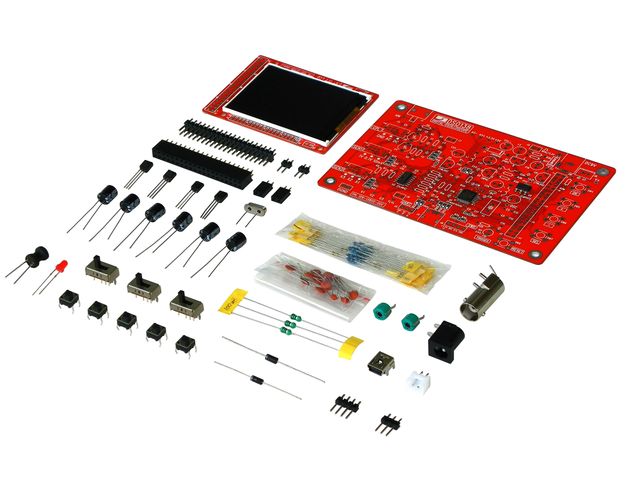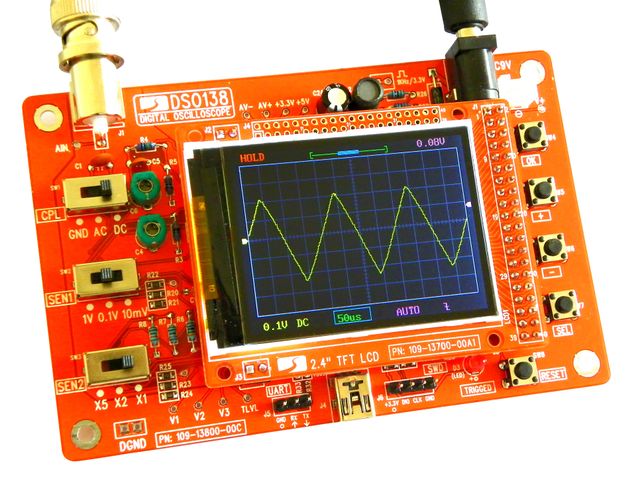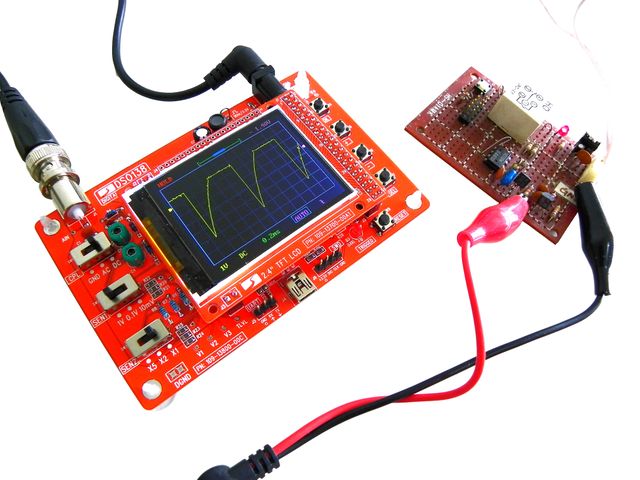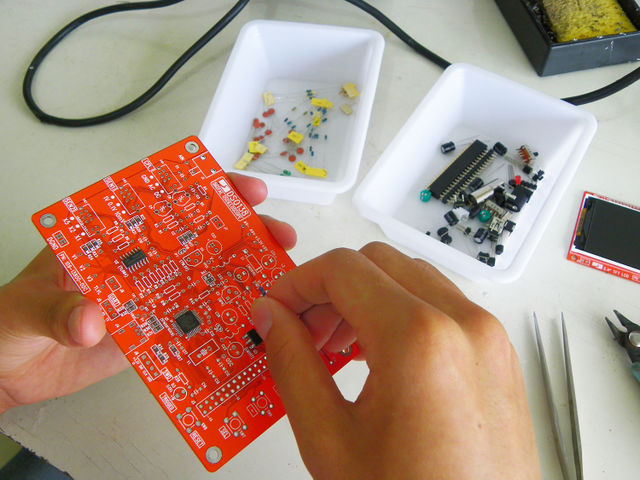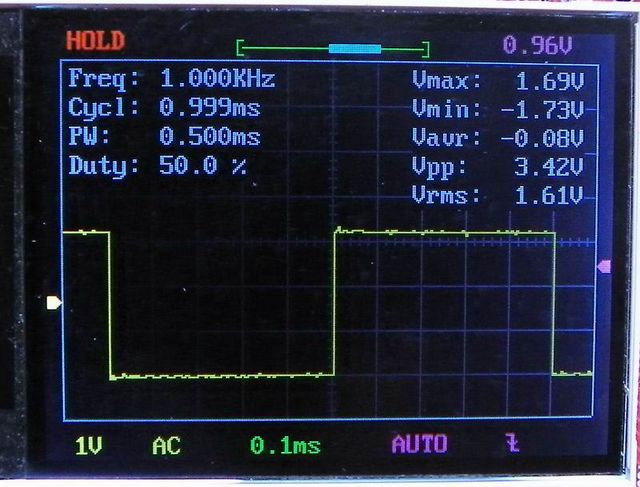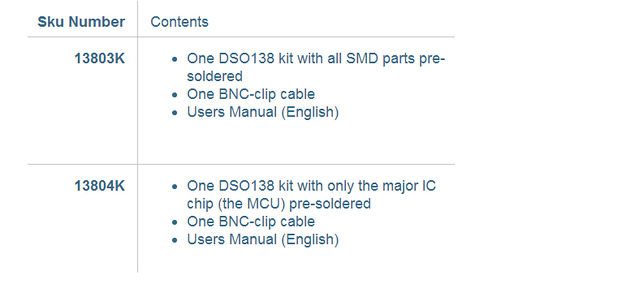Difference between revisions of "DSO138 DIY Kit"
(Created page with "== Introduction == DSO138 was designed as a training oscilloscope kit. It contains only the basical oscilloscope functions with no fancy features. Simplicity in structure an...") |
(→Documents) |
||
| (3 intermediate revisions by the same user not shown) | |||
| Line 14: | Line 14: | ||
DSO138 is partially open-sourced. This opens the possibility for users to add different features or develop new applications on the hardware. | DSO138 is partially open-sourced. This opens the possibility for users to add different features or develop new applications on the hardware. | ||
| + | |||
| + | [[File:DSO138.jpg| 640px]] | ||
| + | |||
| + | [[File:DSO138 (7).jpg| 640px]] | ||
| + | |||
| + | [[File:DSO138 (1).jpg| 640px]] | ||
| + | |||
| + | [[File:DSO138 (6).jpg| 640px]] | ||
| + | |||
| + | [[File:DSO138(2).jpg| 640px]] | ||
| Line 38: | Line 48: | ||
== Ordering Info == | == Ordering Info == | ||
| − | [[File:DSO138.jpg]] | + | [[File:DSO138 (2).jpg| 640px]] |
'''Note 1:''' | '''Note 1:''' | ||
| Line 86: | Line 96: | ||
*Timebase: 10us/Div - 500s/Div | *Timebase: 10us/Div - 500s/Div | ||
*Record Length: 1024 | *Record Length: 1024 | ||
| − | |||
=== Trigger === | === Trigger === | ||
| Line 93: | Line 102: | ||
*Trigger Types: Rising/falling edge | *Trigger Types: Rising/falling edge | ||
*Trigger Position: 1/2 of buffer size fixed | *Trigger Position: 1/2 of buffer size fixed | ||
| − | |||
=== Display === | === Display === | ||
| Line 107: | Line 115: | ||
*Dimension: 117mm X 76mm X 15mm | *Dimension: 117mm X 76mm X 15mm | ||
*Weight: 70 gram (not including cables) | *Weight: 70 gram (not including cables) | ||
| − | |||
== Documents == | == Documents == | ||
| − | *Users Manual [for 13801K/02K(discontinued)] | + | *[https://s3.amazonaws.com/linksprite/DSO138/UserManual_138+1.pdf Users Manual [for 13801K/02K(discontinued)]] |
| − | * | + | *[https://s3.amazonaws.com/linksprite/DSO138/109-13800-00C_AssemblyTop+3.pdf Assembly Drawing] |
| − | + | *[https://s3.amazonaws.com/linksprite/DSO138/SMD_Installation_en+4.pdf Surface Mount Component Installation Guide] | |
| − | *Surface Mount Component Installation Guide | + | *[https://s3.amazonaws.com/linksprite/DSO138/DSO138_SMD_Assembly+5.pdf SMD Part List] |
| − | *SMD Part List | + | *[https://s3.amazonaws.com/linksprite/DSO138/DSO138_SourceCodes_v037+7.rar Source codes [basic version]] |
| − | * | + | *[https://s3.amazonaws.com/linksprite/DSO138/DSO138_Library_v036+(1)+8.rar DSO138 Library] |
| − | + | *[https://s3.amazonaws.com/linksprite/DSO138/HowToUseDSO138Library+9.pdf How to Use the DSO138 Library] | |
| − | *DSO138 Library | + | *[https://s3.amazonaws.com/linksprite/DSO138/105-13700-00A+10.pdf Schematic of the LCD board] |
| − | *How to Use the DSO138 Library | + | *[https://s3.amazonaws.com/linksprite/DSO138/DSO138_oscilloscope_upgrade+11.pdf How to Upgrade firmware for DSO138] |
| − | *Schematic of the LCD board | ||
| − | *How to Upgrade firmware for DSO138 | ||
Latest revision as of 11:49, 7 July 2016
Contents
Introduction
DSO138 was designed as a training oscilloscope kit. It contains only the basical oscilloscope functions with no fancy features. Simplicity in structure and easiness in assembly/operation are among the main targets of the design. For these purpose DSO138 uses mostly through-hole parts. The heart of DSO138 is a Cortex-M3 ARM processor (STM32F103C8) from ST. It uses 2.4-inch TFT LCD (320 X 240 dotmatrix, 262K colors) as its display element and displays nice and clear waveforms. Detailed assembly instructions are provided in combination with troubleshooting guide and schematc. Source codes are also available to allow user to add their own features.
DSO138 kits are sold in two configurations. One is with all SMD parts pre-soldered (PN: 13803K, replacing 13801K). The other is with only the main IC (the MCU) pre-soldered (PN: 13804K, replacing 13802K). The latter serves also as a SMD soldering training kit. For both configurations the MCU has been pre-programmed and no re-programming required.
13803K and 13804K are newly released improved models with following upgradings:
- Significantly lowered noises. Comparing: [NEW] vs [OLD] in measuring the built-in test signal.
- Waveform can be saved to and recalled from non-volatile memory.
- Enhencement in Test Mode with auto short-circuit detection capability.
- Supports two types of TFT controllers (ILI9341 and ILI9325/9328).
DSO138 is partially open-sourced. This opens the possibility for users to add different features or develop new applications on the hardware.
Major features of DSO138
- Analog bandwidth: 0 - 200KHz
- Sampling rate: 1Msps max
- Sensitivity: 10mV/Div - 5V/Div
- Sensitivity error: < 5%
- Vertical resolution: 12-bit
- Timebase: 10us/Div - 500s/Div
- Record length: 1024 points
- Built-in 1KHz/3.3V test signal
- Waveform frozen (HOLD) function available
- Save/recall waveform
Important Notes
- It is assumed that users have adaquate soldering skills and troubleshooting skills to assemble the DSO138 kits. It is not guaranteed that you will end up with a working device. But we make as much efforts as we can to approach that goal.
- Before packing each mainboard has been tested to ensure no short or open on MCU soldering (see [Video] Board Test in Production ). Each LCD board is also tested to verify soldering is good and display is functional. However, all the rest components are provided with good quality at our best knowledge. They are not tested since that is not practical in production.
- For 13804K kit SMD component soldering skills are required. SMD parts should be installed before all other through-hole parts. It is strongly suggested to search the internet to get knowledge of SMD soldering if you are not sure of and want to purchase the 13804K kit.
Ordering Info
Note 1:
A 9V DC power supply is required to run DSO138. Power supply is not included in the kit. It is recommended to use the 5V-to-9V Step-up Converter JYE140 to power DSO138 by battery or USB. [see Photo: DSO138 working with JYE140]
Note 2:
The only hardware diffference between 13803K/04K and 13801K/02K is the value of R11. For 13803K/04K R11 uses 150 ohm. For 13801K/02K it is 1.5K.
Note 3:
All firmware versions earlier than 113-13801-050 (including the source code package) can only be used with 13801K/02K. 113-13801-050 is for 13803K/04K.
Note 4:
For models 13803K and 13804K to use the open-source firmware users need to change R11 to 1.5K (this converts 13803K/04K to 13801K/02K).
Note 5:
Models 13801K and 13802K were discontinued. Shipment of 13801K/02K were stopped as of July 1, 2015
Important:
For model 13804K it is strongly recommended to install all SMD parts first and then the through-hole parts. Otherwise, installed through-hole parts will make SMD parts soldering difficult.
Specification
Vertical
- Number of Channel: 1
- Analog Bandwidth: 0 - 200KHz
- Sensitivity: 10mV/Div - 5V/Div
- Sensitivity error: < 5%
- Resolution: 12-bit
- Input Impedance: 1M ohm
- Maximum Input voltage: 50Vpk
- Coupling: DC, AC, GND
Horizontal
- Max Real-time Sampling Rate: 1Msps
- Timebase: 10us/Div - 500s/Div
- Record Length: 1024
Trigger
- Trigger Modes: Auto, Normal, Single
- Trigger Types: Rising/falling edge
- Trigger Position: 1/2 of buffer size fixed
Display
- 2.4-inch color TFT LCD with 320 x 240 resolution
Power Supply
- 9V DC (8 - 12V acceptable)
- Supply Current: 120mA
Physical
- Dimension: 117mm X 76mm X 15mm
- Weight: 70 gram (not including cables)
